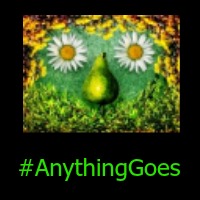 |
| We're more than simple dominoes... |
Funnily enough our global flora and fauna are far more resilient than we might imagine, and while it’s still important for us to reduce our polluting and damaging activities, our natural environments are likely to recover much more quickly than some predict.
The book reminded me that our ecosystems aren’t static and closed systems but open, adaptable and collaborative.
"Our ecosystems are open, adaptable and collaborative"
It's a misconception that each animal or plant only has a single vital role to play, each with its own unique niche, and all stacked up like a fragile row of dominoes. The reality is that different
species collectively tend to perform niche functions within an ecosystem - functions like providing specific habitat, pollinating flowers or dispersing seeds.
Happily, plenty of different species are surprisingly resilient to a changing climate. Yes there are niches, but they're big enough for a number of species!
I was a big fan of Roald Dahl books when I was growing up. To be honest I still am and I'm looking forward to introducing them to my kids when they're old enough. I'm sure that many of you will be familiar with Charlie and The Chocolate Factory. In the story Charlie finds a winning golden ticket in a chocolate bar which leads him into adventures beyond his wildest dreams. I do wonder whether we have times in our lives where we feel that finding our place, our calling, our niche is like searching for that golden ticket. Maybe we'll find it, more likely we won't, but at least we'll have a nice chocolate bar to eat anyway!
That doesn't make it any easier to find our place in the world, but it does mean that you don't need to panic if you don't feel you've found your purpose yet.
Thinking in ecosystem terms, one thing about niches is that they don't exist in isolation - they can only function as part of something bigger, and they tend to be something to grow into.
When I studied Civil Engineering I didn't have a fixed idea in my mind of what I'd end up doing with it.
I figured that was a sensible vocational degree to study, especially in the absence of any other good ideas! Thinking back I picked it because it was the broadest engineering discipline and so it left my options open.
In my working life this is a niche I happen to be filling at the moment, but it's unlikely to always be the case. Change is inevitable, and thinking in portfolio terms helps us to consider other niches we could fill. If you've never read Who Moved My Cheese? it's a fantastic little parable about dealing with change in our lives, especially in our working lives.
Happily, plenty of different species are surprisingly resilient to a changing climate. Yes there are niches, but they're big enough for a number of species!
I was a big fan of Roald Dahl books when I was growing up. To be honest I still am and I'm looking forward to introducing them to my kids when they're old enough. I'm sure that many of you will be familiar with Charlie and The Chocolate Factory. In the story Charlie finds a winning golden ticket in a chocolate bar which leads him into adventures beyond his wildest dreams. I do wonder whether we have times in our lives where we feel that finding our place, our calling, our niche is like searching for that golden ticket. Maybe we'll find it, more likely we won't, but at least we'll have a nice chocolate bar to eat anyway!
"Different species collectively tend to perform niche functions within an ecosystem"The "golden ticket" mindset that we've only got a narrow niche to fill in life, that we're a single domino to be placed in line, can be restrictive and discouraging. Of course there's no harm in searching for that golden ticket, but maybe there isn't just one ticket to be found. Like the broad ecological niches, our lives are best thought of as a broad portfolio, richer and more nuanced than being a single domino with a single position. As Jeff Goins might say, we can be a jack of all trades and master of some.
 |
| Still looking for the golden ticket?? |
Thinking in ecosystem terms, one thing about niches is that they don't exist in isolation - they can only function as part of something bigger, and they tend to be something to grow into.
When I studied Civil Engineering I didn't have a fixed idea in my mind of what I'd end up doing with it.
I figured that was a sensible vocational degree to study, especially in the absence of any other good ideas! Thinking back I picked it because it was the broadest engineering discipline and so it left my options open.
"The Golden Ticket mindset that we've only got a narrow niche to fill in life can be restrictive and discouraging."Fast forward over thirteen years and I've found myself to be a specialist generalist - by which I mean I have broad skills in lots of areas but have ended up pretty specialist in the area of water and flood risk. I must say that this wasn't an intentional niche to fill, but as I've been part of a diverse organisation I've learnt lots of skills, undertaken lots of projects and found myself especially adept in one area above others. But it's a wide niche, accommodating others, and it's not exclusive - I can cover lots of other bases too. It's good to be adaptable!
In my working life this is a niche I happen to be filling at the moment, but it's unlikely to always be the case. Change is inevitable, and thinking in portfolio terms helps us to consider other niches we could fill. If you've never read Who Moved My Cheese? it's a fantastic little parable about dealing with change in our lives, especially in our working lives.
So don't worry if you don't feel like you've found your niche yet, if you're still searching for your golden ticket. The main thing is to be a part of a wider ecosystem, to be connected to something bigger, and see what grows - maybe there's a dozen silver tickets to find instead!
Likewise, if you're happily in your niche, don't get complacent - change is happening faster than you may think! So stay open-minded, grateful and aware of your environment. Your next niche may be closer than you know...
"Change is inevitable, and thinking in portfolio terms helps us to consider other niches we could fill."
*************
Thanks for taking the time to read Finding Your Niche. If you've enjoyed it please share it with your friends on social media! Why not subscribe to The Potting Shed Podcast on iTunes for the audio version and much more (direct RSS feed is here).
I'd love to hear from you, so feel free to comment below or email me at stricklandmusings@gmail.com
If you want to stay up to date please sign up to my mailing list, and do check out my book Life Space on Amazon.



